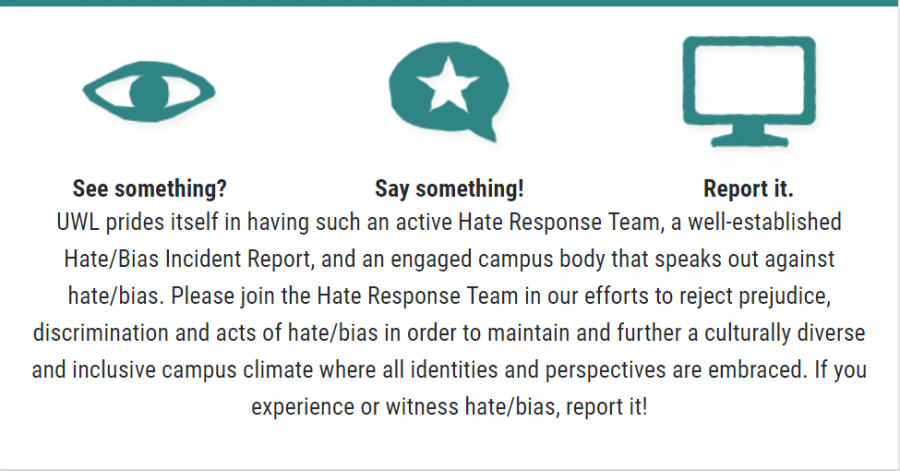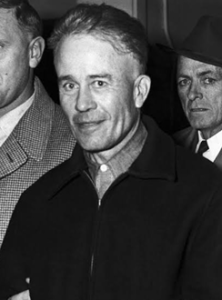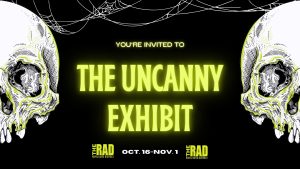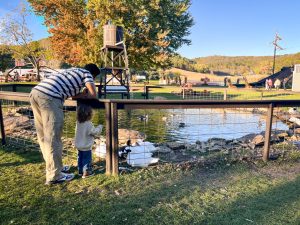An Insight on Hate and Bias Reports at UWL
October 4, 2018
University of Wisconsin-La Crosse’s Hate and Bias Response Team has been assembled since 2005. It is comprised of twelve members all of whom work in different departments at UWL. These members, ranging from University Police to professors, collectively address and track hate and bias incidents on campus. So far, there have been 48 incidents this 2018-2019 school year, the top targeted identity being sex.
Although this is an increase from the 2017-2018 school year which had 92 incidents total, Laura Abellera, a graduate student at UWL who is also on the Hate and Bias Team, said “It’s not necessarily a bad thing for the reporting to be up…it lets us know what identities are being targeted and what we should be teaching.” She noted that hate, and bias is always happening, and she would rather have it be reported then go unlooked.
SEEDs, Students Educating and Embracing Diversity are peer educators on campus that work to make more inclusive spaces in the residence halls as well as the classroom. Currently, SEEDs are working on educating UWL 100 students about microaggressions, a bias one identity may hold towards another and is seen within conversation, prejudice, actions, etc.
Experiencing microaggressions can be a form of hate and bias. When asked what students should be reporting, Abellera suggested “[to] air on the side of reporting if they feel something hurt them. The more information the better.”
Ren Orth, a sophomore at UWL and resident assistant in Laux Hall, responded to the 35 incidents that have been recorded in the residence halls. They stated, “It is ridiculously disappointing, usually home is a safe space or at least a place you can be alone, and now you’re in a home that isn’t safe.” They also said that they are more disappointed that “there are people who want to bring hate into their home.”
One can submit a hate and bias report from UWL’s Hate and Bias page. Students are required to leave information about their identity and the incident on the form but do not have to include their name. When receiving the report, the Hate and Bias Response Team’s job is to “keep the door open for anything the reporter needs,” said Abellera, even if it is just to debrief about how the incident impacted them. The Hate and Bias Response Team works closely with the Counseling and Testing Center, Pride Center, Multicultural Student Services and other organizations on campus. Students can also change their mind about being contacted if they feel they need the extra support post submission of the form.
Abellera explained that hate and bias incidents have a lasting impact, “sometimes the non-physical violence can stick with the person for the entirety of their lives.” It is the Hate and Bias Response Team’s job to review these incidents to see what UWL’s ‘campus climate’ is.
A student reporting does not have to be the victim of the incident to file a report. During this academic school year, 77 percent of reports were completed were upstanders. According to UWL’s Hate and Bias page, “an ‘upstander’ is someone who recognizes when something is wrong and acts to make it right.” Because of upstanders, there can be multiple reports for the same incident.
Even though the number of hate and bias reports has risen, UWL prides itself for having such an active Hate and Bias Response Team. It has been the longest standing Hate Response Team in the UW System and is frequently contacted by other universities to help start their own. Through UWL’s Hate and Bias page, one can see how many reports have been completed, where these incidents have occurred and what identities are being targeted. .
Hate is not a UWL value and UWL’s Hate and Response Team is prepared to integrate the conversation around campus to highlight the true issues that occur at UWL and create a more inclusive environment for all identities.






